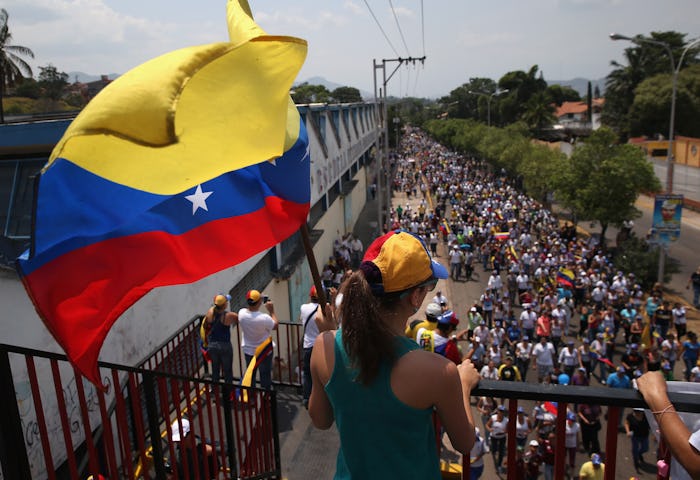News

Kids In Venezuela Desperately Need Your Help
Just in case you've been laser-focused on domestic politics or crises elsewhere and haven't noticed yet, Venezuela needs some attention. Since Hugo Chavéz's death in 2013, Nicolás Maduro has been the president of Venezuela, but it's been a disaster since then. Even before he took over from Chavéz, the country was in the midst of an economic crisis and now that opposition parties have been challenging Maduro's leadership (and have been fighting against Chavism for years), a very real humanitarian crisis is playing out. It's never too late, but donating to kids in Venezuela and trying to help might actually be more difficult than it should've ever been because of the situation on the ground right now.
On Wednesday, Venezuelan security forces opened fire on peaceful protestors, killing at least three people. But the situation in Venezuela has been escalating for years. According to The Guardian, four in five households are living in poverty and inflation has risen over 800 percent since Maduro has taken power. The Venezuelan government has denied aid and also refuted the suggestion that there is a humanitarian crisis, making it all the more difficult to help, even if you wanted to.
That doesn't change the fact that Venezuelans can't afford to eat, or even pay the estimated $160 fee to apply for a visa to work in neighboring Brazil and get out. So Venezuelans are choosing to walk across the border as refugees, in search of a better situation.
But even Brazil is understandably having trouble accommodating the flow of Venezuelan neighbors into their country. A survey done by Human Rights Watch found that 80 percent of the hospital patients in a tiny Brazilian border town with just 12,000 residents were Venezuelan immigrants. And that's just in one border state.
Suffice it to say, the situation is dire. In the meantime, here are some ways you can help you can help Venezuelan children, besides just getting informed about what's actually happening.
Donate To Charities In The Region
Because countries like the United States have imposed sanctions on trade with Venezuela, it is hard for the economy to grow. But you can donate to charities on the ground that help innocent families caught up in the mess. Humanitarian Aid for Venezuela, Cedice Libertad, the Human Rights Foundation, and EsLibertad are all good places to start, but you might need to hit that button on the top corner of the web page to let Google translate for you if you don't read Spanish.
Use Social Media
Social media hashtag campaigns are frustrating because, no, you aren't putting food in anyone's mouth or giving women prenatal vitamins directly, and it can seem useless. But when you get a hashtag trending, things can happen. It won't solve the problem, but raising awareness has its merits — remember when video of Omran Daqneesh (the Syrian child that was rescued from beneath the rubble left after an airstrike) went viral on social media? Or when photos of a refugee child washed up on a beach left Twitter, Facebook and so many other platforms angered and ready to pitch in? It's a morbid thought, but social media attention does work. (It's just unfortunate we have to get to that point for people to care.)
In Venezuela's case, people are using #SOSVenezuela or #SOSVNZ on social media to show support and get their followers in formation. Share a news story with a hashtag and inform your followers and get the ball rolling.
Lobby Your Representatives
Foreign policy isn't something that most American citizens feel like they can get involved in, and the relationship between the United States and the Venezuelan government is complicated right now. But, so is the Trump administration's policy about allowing refugees or immigrants into the country. Although the president's attempts at an immigration ban focus on a few Middle Eastern countries, the law, if passed, could extend to any refugees from anywhere. So could a "border wall." This could theoretically affect Venezuelan families, too. Letting your representatives know that you care about what's happening in Venezuela might mean that they'll be more likely to take action when it comes to renegotiating sanctions or sending aid where it's needed — anywhere.
Little things, like just general awareness, can help. There might not be a lot of ways to help Venezuelan children right this very minute, but speaking out and demanding your representatives know what's going on in Venezuela and telling them that you care is a very good place to start.